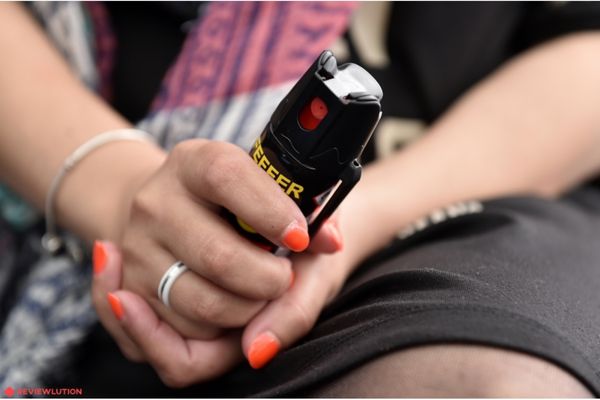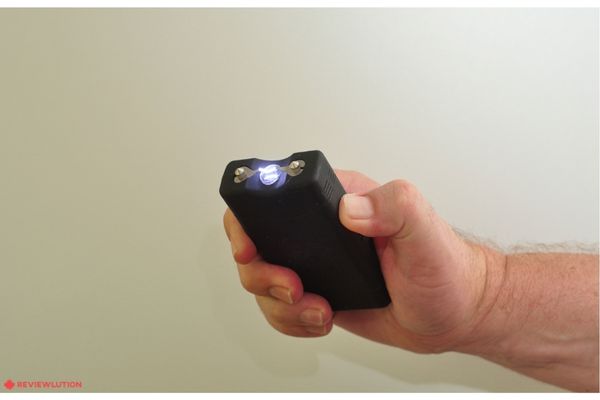Is Pepper Spray Legal in Canada?
Unlike some jurisdictions, such as the United States, and popular media portrayals, the people of Canada are typically barred from carrying mace spray, pepper spray, firearms, and most other weapons. A professional private investigator can assist with these types of inquiries.
Our guide will explore questions like “Is pepper spray legal in Canada?” and rules for using other types of self-defence weapons.
Let’s dive in!
Is Pepper Spray Legal in Canada?
Pepper spray is classified as an illegal weapon under Canada’s Firearms Act. Therefore, manufacturing, selling, or using goods comparable to pepper spray is a criminal offence according to Canada self-defence laws. Additionally, any gas, powder, or liquid spray capable of hurting or immobilizing someone is prohibited.
Every country has its own set of rules that govern self-defence weapons. Pepper spray, for example, is legal in some countries but not in Canada because people can use it as an offensive weapon – to harm, frighten, or incapacitate other people – rather than a defensive weapon.
The Firearms Act, which is part of the Criminal Code of Canada, categorizes firearms as non-restricted, restricted, or prohibited, with each classification resulting in varying criminal penalties for possession, manufacturing, or sale. As a result, carrying pepper spray is punishable by up to ten years in prison.
Difference Between Pepper Spray and Bear Spray
Bear spray is a chemical weapon used to defend people against bear attacks. It’s also a non-lethal weapon frequently confused with personal defence pepper spray due to its similar chemical makeup.
Here are the main differences between the two self defense weapons in Canada:
Pepper spray is prohibited, but bear spray is not.
Bear spray is necessary for outdoor activities such as hiking and camping, and it is therefore legal. It lowers our chances of becoming a bear attack victim. It’s fine to bring it into the city; pepper spray, however, is not.
Pepper spray is not suitable for humans as opposed to bear spray.
People often mix up the two sprays since they contain the same ingredient, oleoresin capsicum (OC). Manufacturers extract it from cayenne peppers’ oily resin. Bear spray has a concentration of roughly 1%, whereas pepper spray has a concentration of 1-3%.
Their canisters have a different design.
Another distinction between pepper spray and bear spray is the design of their canisters. Pepper spray, for example, requires a four-meter space between you and a charging bear, whereas bear spray requires at least a 7.6-meter spray distance. As a result, you have to choose the appropriate one for the right reasons.
A Brief History of Canadian Self-Defence Laws
The act of defending oneself against a real or perceived threat is known as self-defence. The defender frequently uses physical force to hold or prevent an assailant from injuring them.
Many reasons can prompt someone to defend themselves, each with its own set of circumstances. Here are a few examples:
- Attempted assault
- Attempted rape or sexual abuse
- Robbery
- Abduction or kidnapping
- Trespassing
- Extremely threatening behaviour
Self-defence is a common law introduced into the first Canadian Criminal Code in 1892. The law justifies the use of force to repel an attack.
Comparison Between Canadian and United States Self-Defence Legislation
According to statistics, Americans are three times more likely than Canadians to own firearms per capita and five times more likely to own a handgun. Only about 5% of Canadians get a handgun for self-defence.
In contrast, nearly one-third of gun owners in the United States say they maintain firearms for self-defence. The rate of firearm homicides in the United States is seven times greater than in Canada, while the rate of handgun killings is fifteen times higher.
The rate of armed robberies in the United States is over 3.5 times greater than in Canada; the rate of firearm suicides is two times higher.
Moreover, American police officers are seven times more likely than Canadian officers to be killed in the line of duty, almost always by weapons. The results also reveal that Americans are more supportive of civilian gun ownership and self-defence than Canadians; they also emphasize individual liberties.
Only in exceptional circumstances, citizens may carry self-defence weapons in Canada; in the United States, most states allow citizens to carry concealed weapons. Both countries have a long history of hunting and sport shooting with firearms.
Furthermore, pepper spray is legal in all 50 states and Washington D.C. for self-defence. Some states, however, only authorize the use and carrying of pepper spray in specific circumstances.
Exceptions to Pepper Spray Usage in Canada
One exception allows pepper spray use without the risk of a criminal sentence. While carrying or using pepper spray as a potential form of defence is illegal in Canada, there is one exemption. You can buy and use pepper spray in Canada if:
- it is written on the spray’s dispenser that it is made for animal usage only (such as bear mace)
- the spray meets the requirements of the Pest Control Product Act of Canada.
However, if you get caught using animal spray repellent as a pepper spray for personal defence, you may still face criminal charges.
Wondering where to buy pepper spray in Canada? You can purchase pepper spray in various department stores, hunting stores, outdoor clothing and equipment shops, or online.
Is it Illegal to Carry a Taser in Canada?
You may wonder, if they are allowed in the United States, are tasers legal in Canada?
According to RCMP Cpl Greg Gillis, who teaches police officers how to use tasers, only one company may import them into Canada under a specific permit. They can only sell the devices to law enforcement agencies. Furthermore, like a firearm, every taser is registered and tracked.
What’s the Fine?
Before serving a prison sentence, anyone charged with a firearms offence in Canada must go through the legal system. According to the Canadian Criminal Code, possession charges carry a maximum punishment of five years.
In cases when an unlicensed individual uses a stun gun against another person, a Canadian criminal court can impose a maximum penalty of 14 years. Because the stun will cause substantial pain or injury to the victim, it carries a harsher penalty than possession.
What Can You Carry in Canada to Protect Yourself?
Any weapon used in self-defence must only be used to defend oneself against a severe and likely threat. This is not exclusive to firearms, but it also applies to knives and baseball bats.
Read on to learn what self-defence weapons are legal in Canada.
Are Batons Legal in Canada?
Except for spring-loaded batons, there is no law prohibiting the use of batons. However, carrying any weapon, including a baton, in a concealed manner is a crime under section 90 of the Criminal Code.
Are Kitty Keychains Legal in Canada?
The Cat Eyes self-defence keychain in Canada is a prohibited weapon. These keychains are similar in design to brass knuckles, which are also banned in Canada and are made of a metal or hard material band with finger holes designed to fit over the fingers of the hand.
Are Double-Edged Knives Legal in Canada?
There is no law prohibiting the carrying of knives with sheaths, knives that require both hands to open, fixed-blade knives, and certain non-prohibited folding knives, presuming they are not for self-defence. So, double-edged knives are among the legal knives in Canada.
List of prohibited weapons in Canada
Here’s a list of prohibited weapons in Canada:
- Automatically Opening Knives
- Spring-assisted blades
- Mace, Pepper Spray and other Gases
- Nunchaku
- Shuriken (Throwing Stars)
- Kusari (Weighted Flails)
- Finger Rings with Projecting Blades
- Energy Conducted Weapons (tasers)
- One-handed Crossbows
Classes of Firearms
In Canada, there are three categories of firearms:
- Non-restricted
- Restricted
- Prohibited
Non-restricted
Any rifle or shotgun that is neither restricted nor forbidden falls into this category. Long guns are generally considered legal self-defense weapons in Canada, but there are several exceptions.
Restricted
- Handguns that are not prohibited firearms
- Firearms that:
- are not prohibited firearms;
- have a barrel length of less than 470mm;
- can discharge center-fire ammunition semi-automatically.
- Firearms constructed or adapted to be discharged when folded, telescoping, or otherwise reduced to a length of less than 660mm.
- Firearms of any other kind that defined as prohibited firearms in the Regulations.
Prohibited
- Handguns with barrels that are 105mm in length or less
- Handguns that can fire 25 or 32 calibre cartridge
- This excludes handguns used in international sporting competitions governed by the International Shooting Union’s standards, where the handgun is prohibited
- Firearms that have been altered from a rifle or shotgun, whether by sawing, cutting, or any other means, and are:
- Less than 660mm in length
- 660mm or longer and have a barrel less than 457mm in length
- Automatic guns, whether or not modified to fire only one shot with one trigger pull
- Firearms listed in the Regulations as prohibited firearms.
Permitted ownership purposes
You may be permitted to acquire or possess a prohibited firearm for the following reasons:
- target practise or target shooting contests
- as part of a collection
- in restricted cases, use in conjunction with one’s authorized profession or occupation, or safeguard one’s life.
Possession of a firearm without a license in Canada is illegal under Section 91(1) and (2) of the Criminal Code. This offence carries a maximum sentence of five years in prison.
Conclusion
The most important aspect of pepper spray is that it is highly effective in self-defence and protection. Before you become a victim, you can eliminate any threat. However, pepper spray is illegal in Canada.
As a result, it’s advisable to avoid using it. As the Canadian government advocates self-defence, you can always turn to other legal options to defend yourself.
Furthermore, many different types of weapons are available for self-defence, but not all of them are legal in Canada. It is important to be aware of the law before carrying any type of weapon.
FAQ
When used against humans, the bear spray would be considered an illegal weapon.
While you can buy dog spray in Canada, depending on the circumstances, the way you use it or even carry it may be illegal. It is permissible to use dog spray on dogs and bears, but not on humans.
You can use coyote spray on dogs and coyotes. However, it is illegal to use it on humans.
Canadians may use force to protect their possessions and themselves. An individual is justified in taking action to prevent a break-in. They must, however, stop using force after the attacker submits. They must also not use more force than is required.
Any weapon used in self-defence must only be used to defend oneself against a severe and likely threat. This is not limited to firearms; it also applies to other weapons such as knives and baseball bats.
In Canada, firearms are regulated by the federal government. Automatic firearms and sawed-off shotguns and rifles are prohibited by the Federal Criminal Law Amendment Act of 1977. There are three categories of firearms in Canadian law: non-restricted, restricted, and prohibited firearms.
Yes, as long as it’s just being used as a tool and not for self-defence. Some knives, such as butterfly knives and switchblades, are prohibited weapons, and even if there is no length restriction, carrying long knives down the street will attract police attention.
According to Canada’s Firearms Act, pepper spray is an illegal weapon. This means that any manufacturing, selling, or using of goods similar to pepper spray is a criminal offence.












